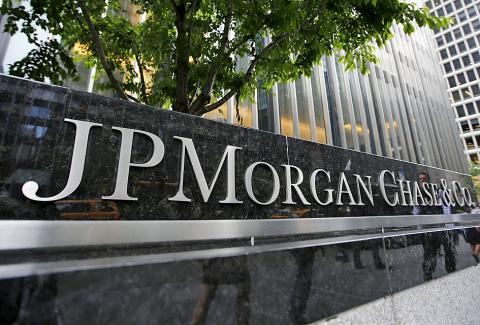US companies last year sent home more than half a trillion US dollars of cash they held overseas to take advantage of tax changes, but data suggest the pace is slowing, potentially removing a key source of support for Wall Street.
US dollar repatriation in the July-to-September period fell to US$93 billion, about half of second-quarter volumes and less than one-third of the US$300 billion or so sent home from January to March, US current account data showed.
The repatriation bonanza followed new regulations that allowed the US government to tax profits accumulated overseas, regardless of where the money was held.

Photo: Reuters
Prior rules allowed companies to “defer” US tax on worldwide profits unless they repatriated the money.
The change offered a powerful incentive to bring home some of the US$3 trillion US firms were believed to hold in jurisdictions ranging from Ireland to Switzerland, either in cash or in securities such as US Treasuries.
However, investment bank JPMorgan Chase & Co said the flows were on “a rapidly decelerating trajectory.”
The current account data showed repatriation in all sectors.
Looking at just non-financial companies, JPMorgan calculated that US$60 billion was repatriated in the third quarter of last year, versus US$225 billion in the first quarter and US$115 billion in the second quarter.
Because companies had probably already prebooked a one-off tax hit for last year, repatriation would have dwindled further in the last quarter of the year, it predicted.
Repatriation flows were also evident from data released by US Treasury International Capital (TIC).
That shows Treasury bond holdings falling in locations that are well known as low-tax jurisdictions or overseas bases of US companies or that host significant fund management or custody business.
Ireland, which hosts the European hubs of US technology and pharmaceutical companies, such as Apple Inc and Pfizer Inc, saw Treasury holdings drop by US$40 billion between the end of 2017 and the end of October last year, TIC data released on Dec. 17 showed.
The holdings fell by more than one-10th in January to October to US$287.6 billion.
Shrinking repatriation is likely to affect markets, because the flows helped fund last year’s record US$1 trillion in US share buybacks.
A Jefferies Group LLC analysis of a US Federal Reserve paper looking at the use of repatriated cash concluded that it had significantly enhanced buybacks, effectively placing a floor under stock markets.
However, US equities have endured a dismal few months as worries have grown for economic growth.
The final quarter of last year has been the worst for the S&P500 index since the end of 2008, when the Lehman Brothers Holdings Inc crisis erupted.
Should flows dwindle further, “the extra boost that US repatriation provided to US equity and bond markets via share buybacks and corporate bond redemptions would likely dissipate next year,” JPMorgan told clients.
Meanwhile, bond markets saw reduced issuance, as companies drew on repatriation proceeds.
The 10 biggest US multinationals, including six tech companies, sold zero bonds last year, after raising US$80 billion annually on average in the previous three years, Goldman Sachs Group Inc said, adding that this had supported bond performance last year.
The US dollar might be affected less — a significant part of the offshore-held cash is already believed to be in US dollars, whether cash or Treasuries.
However, repatriation probably supported the currency at the margins by tightening US dollar supply outside the US, so dwindling flows could act as another drag on the greenback.

Intel Corp chief executive officer Lip-Bu Tan (陳立武) is expected to meet with Taiwanese suppliers next month in conjunction with the opening of the Computex Taipei trade show, supply chain sources said on Monday. The visit, the first for Tan to Taiwan since assuming his new post last month, would be aimed at enhancing Intel’s ties with suppliers in Taiwan as he attempts to help turn around the struggling US chipmaker, the sources said. Tan is to hold a banquet to celebrate Intel’s 40-year presence in Taiwan before Computex opens on May 20 and invite dozens of Taiwanese suppliers to exchange views

Application-specific integrated circuit designer Faraday Technology Corp (智原) yesterday said that although revenue this quarter would decline 30 percent from last quarter, it retained its full-year forecast of revenue growth of 100 percent. The company attributed the quarterly drop to a slowdown in customers’ production of chips using Faraday’s advanced packaging technology. The company is still confident about its revenue growth this year, given its strong “design-win” — or the projects it won to help customers design their chips, Faraday president Steve Wang (王國雍) told an online earnings conference. “The design-win this year is better than we expected. We believe we will win

Quanta Computer Inc (廣達) chairman Barry Lam (林百里) is expected to share his views about the artificial intelligence (AI) industry’s prospects during his speech at the company’s 37th anniversary ceremony, as AI servers have become a new growth engine for the equipment manufacturing service provider. Lam’s speech is much anticipated, as Quanta has risen as one of the world’s major AI server suppliers. The company reported a 30 percent year-on-year growth in consolidated revenue to NT$1.41 trillion (US$43.35 billion) last year, thanks to fast-growing demand for servers, especially those with AI capabilities. The company told investors in November last year that

Power supply and electronic components maker Delta Electronics Inc (台達電) yesterday said it plans to ship its new 1 megawatt charging systems for electric trucks and buses in the first half of next year at the earliest. The new charging piles, which deliver up to 1 megawatt of charging power, are designed for heavy-duty electric vehicles, and support a maximum current of 1,500 amperes and output of 1,250 volts, Delta said in a news release. “If everything goes smoothly, we could begin shipping those new charging systems as early as in the first half of next year,” a company official said. The new